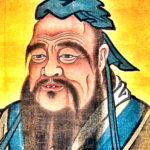Daoism Philosophy
Taoism is one of the world’s great religions. Birthed in Ancient China, it also influenced several other religions, including Confucianism (which it mostly opposed) and Buddhism (which it merged with to create Zen). Based on the idea that there is a natural law or “way” at work in the world which gives rise to universal patterns of ethics and organization, Taoism is primarily a metaphysical framework for living.
However, Taoism can also be spelled “Daoism.” In fact, Taoism is pronounced “Daoism.”
Daoism can be seen as a modernized and simplified version of traditional Taoism, one which places an emphasis on the teachings and ideas in the foundational texts, The Tao Te Ching and the Chuang Tzu, and doesn’t make use of the metaphysics and superstition which traditional Taoism tends to purvey. You can visit daoism.org for more information on Daoist philosophy.
Daoism History
When Western scholars discovered Taoism, they tried to make sense of it through their Christian, and later, rationalist, lenses. They decided that there were two types of Taoism: Philosophical Taoism, and Religious Taoism and that the former was the “real” Taoism which only later became corrupted to become the superstitious version it is today. However, today most scholars believe that there never really was a Philosophical Taoism and that Taoism had always been more or less superstitious.
Part of the reason for this misunderstanding is that the original Taoist books The Tao Te Ching, The Chuang Tzu, and The Lieh Tzu, are all quite rational books of philosophy and don’t contain any superstitious doctrine at all. These books remain very popular today — in fact the Tao Te Ching is the second-most translated book after the Christian bible.
Daoist Practice
One of the main practices of Daoism is Wu Wei, or “non-coercive action.” The Daoist learns not to force things, but to allow them to happen naturally. To act non-coercively is to attend to the task at hand with extreme humility – not pushing nor pulling but gently (and respectfully) guiding and offering one’s energy to the endeavor. Additionally, the Daoist does not attach themselves strongly to outcomes — they will do their best but if things don’t work out the way they planned, they change their expectations to accommodate new developments or turns in the road.
The Daoist develops a perspective in which they are not at the center of everything, but rather a part in a much greater whole. This radical humility does not render one weak, however. On the contrary, from the Daoist perspective, seeing oneself as part of a larger and more powerful organism affords them the power of that greater organism. It is our seeing ourselves as separate that alienates us and renders us ineffective and isolated.
Daoisms
My feeling or philosophy is closer to Taoism and Zen Buddhism, ’cause it’s the most practical.
— Harry Dean Stanton
Taoism taught me to focus on the process and not to be attached to preconceived ideas of what I thought the outcome should be.
— Jimmy Chin
Tao doesn’t force or interfere with things, but lets them work in their own way, to produce results naturally. Then whatever needs to be done is done.
— Benjamin Hoff
Daoism Community
Get ordained as a Daoist Minister








Daoism was meant to be free. You can’t buy it although there are those that sell it. Want to be a daoist priest? You can’t anywhere except China. You will learn about spirits, magic, and how to wear a dress. That’s not the Dao. It’s being a professional religious and earn a buck. Here you can learn philosophical daoism and encourage other like minds.